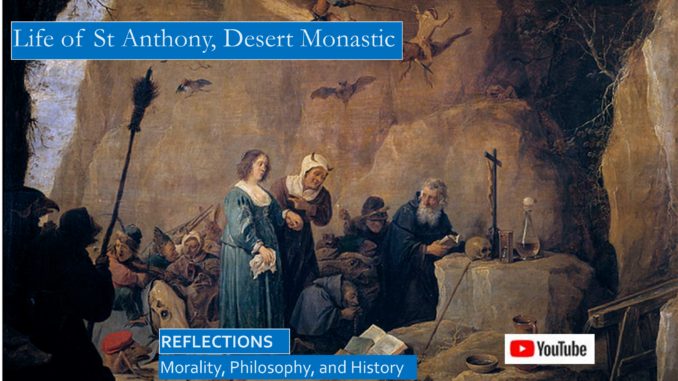
One day St Anthony went into church as this Gospel verse was being read:
Jesus said, “If you wish to be perfect, go, sell your possessions, and give the money to the poor, and you will have treasure in heaven; then come, follow me.”[1]
Anthony perceived that this verse was directed at him, so he IMMEDIATELY gave the family land, his inheritance, and his other possessions to the poor, leaving some money for his younger sister.
Anthony was able to do this because his parents had departed. His younger sister was put in a convent to be raised, and we can surmise the convent was where she wanted to go, because if this was not the best place for her Anthony would have taken another path. No degree on saintliness on his part would have been worth the price of her unhappiness and her soul.
Immediately is a word you see quite often in the first Gospel of Mark. When should you repent and live a godly life? When should you start caring for your neighbor? When should you follow the way of the Lord? IMMEDIATELY.
These verses spoke to many saints, and are referenced in the Catholic Catechism as a guard against coveting, against loving the treasures of this world more than the treasures of heaven.
Click here for the blog on the Catholic Catechism.
The Life of St Anthony also helped convict St Augustine to convert to living a Christian life.
Not many of us can follow Jesus’ words, giving up all we have, living a godly life of prayer in the desert, most of us have wives and children and older parents, most of us just cannot do it. Sin crouches at our door, but we can master it; likewise our possessions should not own us, we should not live simply to acquire more, but live to make a difference, and our possessions should make a difference and strengthen our relationships and not just stoke our lust for entertainment.
Some churches sponsor cruises for extended Bible study, is this such a good thing? How can you study the Bible when you are surrounded by drinking, gambling, and food, food, free food everywhere? How can you enjoy the cruise, when all about you there is the third-world crew, and if you only imagine what would it would be like to live their lives, working hard, no days off, being paid very little, no pensions, no savings, sleeping in a cramped and dingy cabin, living a lonely life on board ship, while they are compelled to dance and party and look happy at the dinner to entertain the guests, some who insist that the tips be taken off their accounts?
I have gone on several cruises and I asked my priest, was that such a good thing? He asked me why I went, and I said that my favorite youngest daughter exclaimed that this was her best vacation ever! We had no desire to park her with the pre-teens abandoned by their parents, but I suggested she could cherry-pick any bigger kids’ activities that looked fun, but she had no desire to even review what was available, so we hung out the whole time, going down the water slides, playing bingo and the silly games, seeing the musical shows. Although I am ambivalent about cruises, my priest said that for us a cruise was a good thing.
St Anthony “was constant in prayer, knowing that a man ought to pray in secret unceasingly.” St Anthony learned and imitated all the holy men he could meet, imitating the strengths of each, “the graciousness of one, unceasing prayer,” “freedom from anger, lovingkindness,” meekness and long-suffering, endurance and sleeping on the ground, and “the piety towards Christ and the mutual love which animated all the holy men.” St Anthony strove not hurt the feelings of any, avoiding feelings of superiority, “but made them rejoice over him,” as they encouraged each other.
St Anthony would spend all his remaining years as a hermit in the desert, praying, eating little, owning nothing, but having all he needed, living in excellent health past the age of one hundred. Soon after he read “The Life of St Anthony,” St Augustine was inspired to leave his secular career as a court rhetorician and lead a simple life of poverty devoted to Christ.
St Anthony arranged for an acquaintance to bring him bread every few days, and he shut himself up in the tombs where he prayed and battled the devil and the demons, who made such a din that the tombs were shaken like an earthquake, and fought for many hours with demons who took on the forms of “lions, bears, leopards, bulls, serpents, asps, scorpions, and wolves,” striking, goading and abusing, but St Anthony did not lose faith, declaring, “faith in the Lord is a seal and wall of safety.”
At long last a ray of light descended in the tomb, “the demons suddenly vanished,” his pains ceased, and the building was made whole. St Anthony asked the Lord, “Where were you? Why did you not appear in the beginning to ease my pains?” “A voice came to him, ‘Anthony, I was here, but I waited to see your fight, you endured and was not defeated, I will always comfort you, and will make your name known everywhere.’ Having heard this, Anthony rose and prayed,” and became stronger through his trials.
This story should inspire us not to be discouraged during those hard times when we pray for delivery from our suffering, those hard time when nothing goes right in our lives, those hard times that sometimes seem to go on and on for so long. We should also pray for the strength to endure those hard times, and not be angry with God when He appears not to listen, for God always listens, sometimes God speaks in a small quiet voice in the desert, sometimes God strengthens, sometimes God delivers, but always God desires us to endure.
Then St Anthony drew further into the desert, walling himself into an abandoned fort, praying and battling the demons, “for nearly twenty years he trained himself in solitude, never going forth, seldom seen by any.” Many came out to the desert “eager to imitate his discipline,” and his acquaintances wrenched the door of the fort open. They were amazed when he came out, neither fat nor lean, not aging a day in those twenty years. Because of his unceasing fasting and prayer “his soul was free from blemish, not contracted by grief, not relaxed by pleasure, not possessed by laughter or dejection, he was not troubled by the crowd,” nor was he affected by the admiration of the crowd. The Lord in His grace gave great speaking ability to St Anthony, and he persuaded many to live the solitary life near the fort, founding the first monastic community in the early Church.[2]
St Anthony Blog 2 http://www.seekingvirtueandwisdom.com/life-of-st-anthony-blog-2-living-a-monastic-life/
[1] https://www.biblegateway.com/passage/?search=matthew+19%3A21&version=NRSVCE
[2] St Athanasius of Alexandria, “The Life of St Anthony of Egypt,” translated by Philip Schaff and Henry Wace (Middleton, DE: First Rate Publishers, 2016).

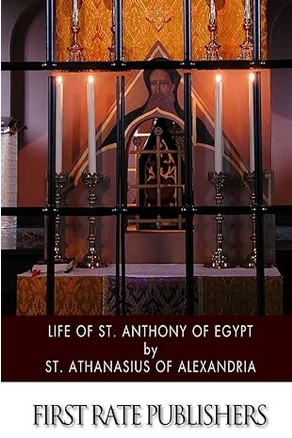
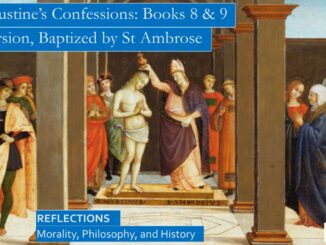
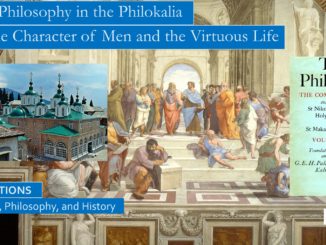
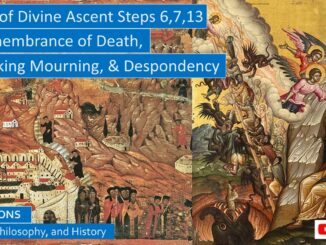
1 Trackback / Pingback